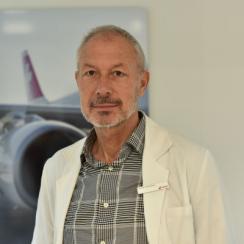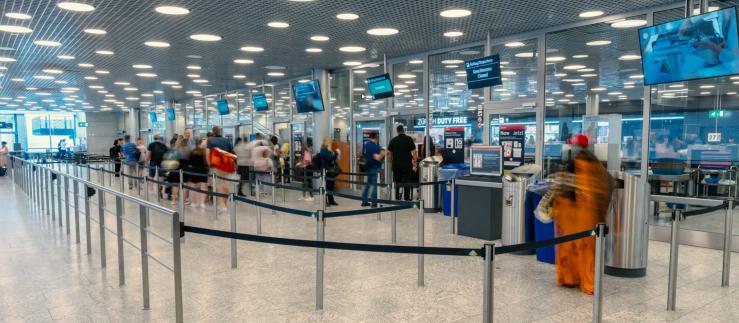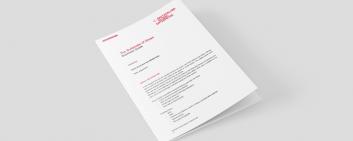The chief responsibility of Swiss Medical Services is to provide medical care to the Swiss flying personnel: every year, pilots must undergo medical tests to assess their fitness for flying; cabin crew are tested every five years. The doctors carrying out this work at Swiss Medical Services also serve as medical officers of the Swiss Federal Office of Civil Aviation. This specialist service unit is also responsible for tasks such as evaluating epidemiological risk levels, issuing occupational health clarifications and assessing sick passengers’ fitness to fly on board Swiss aircraft. These are tasks requiring comprehensive medical know-how.
The expertise and experience of Swiss Medical Services in the field of travel medicine are also available to passengers. Click on this website for a wide range of information: in addition to practical tips on flying, other topics include motion sickness, fear of flying, flying with diabetes or an earache, or flying during pregnancy. The Swiss Medical Services office in Kloten is also a public vaccination centre with consulting hours every afternoon from 13:00 h to 16:30 h. If you are planning to visit exotic countries, you can have your vaccination status checked there, and updated if necessary. A doctor will advise you which vaccinations are recommended or even mandatory in your destination region.
Spotlight on thrombosis risks and jet lag
From a passenger perspective, there are two main topics: thrombosis and jet lag. While short-haul flights can be taken with ease, long-haul flights place greater demands on the human body. “In our estimation, flights of over four to five hours present a slightly higher risk of thrombosis”, states Dr med. Ulrich Stössel, the long-standing director of Swiss Medical Services. Those most at risk are persons with an existing heart or lung condition, who are substantially overweight, or who have already suffered from thrombosis. There is no scientific evidence indicating that the increased risk of thrombosis can be traced back to flying specifically, according to Stössel. It is, he says, rather a consequence of sitting for hours on end, similar to long journeys by car or bus. As Stössel, FMH member for Internal Medicine and Occupational Medicine explains: “sitting immobile for long periods with the legs bent restricts and slows down the flow of blood through the veins to the heart. Because slow-flowing blood has a greater tendency to clot, the risk of blood clots increases.”
Effectively reducing the thrombosis risk
Drinking plenty of fluids, which tends to thin the blood, and moving around as much as possible to increase blood flow, will have a preventive effect. Just by flexing your feet and making small circular movements to stimulate the calf muscles from time to time will help. Coffee and alcohol are counterproductive because they cause your body to dehydrate. “For those who belong to a high-risk group, we also recommend compression stockings, or consulting their doctor about a blood-thinning agent”, adds the medical specialist, who is also a member of the Swiss Travel Medicine Committee.
Changing time zones confuses the internal clock
Jet lag is another topic that preoccupies frequent flyers. “Night-time flights and travelling against the flow of your inner clock are stressful”, Stössel explains. “There is no scientific evidence that it is harmful to our health, but it is a fact that the body needs time to readjust from the 24-hour rhythm it is used to and get in sync with the new local day and night cycle”. Finding the best way to deal with jet lag varies from person to person and depends on how long you stay at your destination. For short stays it might be easier to keep to your existing daily rhythm. If you are staying more than three days at your destination, you should immediately adopt the local sleep patterns.
Sleeping during the flight is often a problem too. You can’t force it, Stössel says, but you can take steps to create better conditions for sleep: eat lightly, wear comfortable clothing and avoid lights or sounds that disturb you. If necessary, a prescription sleep medicine may help in some cases. If you can’t actually fall asleep, simply getting some rest is often helpful.
Three questions for Dr med. Ulrich Stössel, the long-standing director of Swiss Medical Services
How do you become a physician in the aviation industry?
Complete your professional training as a doctor (FMH), then do specialised training in travel and aviation medicine. You also need a healthy dose of “aviation fever”!
Is there a reliable source to quickly get information on the various aspects of travel medicine?
At www.safetravel.ch, the home page of the Swiss Committee for Travel Medicine, and on our website.
How do you unwind after a busy day at work?
With my family and with sports, music and literature. I almost forgot: watching films. If I’m feeling a bit down, I have to go to the cinema. That always picks me up again!








